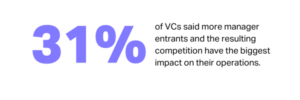
By: Allvue Team
July 31, 2023
Venture capital rode a high for years, with fundraising peaking at the end of 2021. Now, a combination of factors – from higher interest rates to banking pressures – have slowed down the space and created new challenges. As managers strive to boost fundraising and fund performance, they’re encountering several shared operational challenges, prompting CFOs to take a more strategic, offense-oriented role to lead their firms successfully through the volatility.
Allvue recently surveyed a group of GPs to learn about these top challenges, as well as managers’ plans for growth and diversification in the current market environment. Let’s dig into trends specific to venture capital managers from our data.
DOWNLOAD: DATA REPORT – Meeting the Market Moment

Trend 1: The allure of private capital creates higher competition, and VC managers feel the squeeze
Per Allvue’s data, 31% of VCs cited higher competition from other managers entering the space as a top operational challenge. As the private capital space has attracted additional attention and participants, especially amid VC’s period of prolonged outperformance, it’s easy to see why competition is intensifying and drawing in new managers and fund launches.
The heightened competition poses both threats and opportunities for existing VC firms. On one hand, it pushes VCs to be agile, innovative, and discerning in their investment strategies. Firms must continually strive to differentiate themselves to attract quality deals and create value in their portfolio companies to generate attractive returns for their limited partners, especially in a tighter market.
On the other hand, increased competition can also lead to collaboration and co-investment opportunities among VCs, fostering a more robust ecosystem. By forming strategic partnerships, VCs can pool their expertise, networks, and resources, enabling them to tackle larger funding rounds and support startups with a more comprehensive approach.

Trend 2: Many VC managers are answering higher competition by diversifying their strategies
A quarter of VCs plan to explore investing in a new asset class in the next three to five years. Traditionally, venture capitalists have focused on funding early-stage startups in sectors like technology, healthcare, and consumer goods. However, to ensure their firm performance as market dynamics shift and new opportunities arise, VCs are seeking to diversify their portfolios and explore untapped markets.
Investing in new asset classes allows VCs to hedge their risks and capitalize on emerging trends. For instance, we are witnessing a surge in demand for sustainable and impact-driven investments. Many VCs are looking to allocate capital to startups that prioritize environmental, social, and governance (ESG) principles, aligning their investments with their investors’ values and contributing to a more sustainable future.
And as the private debt space has experienced a boost of new attention thanks to climbing interest rates, venture debt has become an appealing new sector for many VC managers looking to diversify their strategies.

Trend 3: VCs trust in an outsourced back office
Our survey found that 86% of VCs use a fund administrator to manage their back-office operations. As VC firms grow and take on more complex investments, the burden of administrative tasks can become overwhelming. Fund administrators play a crucial role in streamlining operational processes, allowing VCs to focus on their core competency of sourcing, evaluating, and supporting startups.
By outsourcing these tasks like fund accounting, investor reporting, investor communication, and compliance management, VCs can reduce operational overhead, improve efficiency, and ensure compliance with ever-changing regulatory requirements. In an environment of higher-that-ever competition, it makes sense that more VCs are deeming fund administrators as a worthy investment to support their lean teams.
How VC managers can tackle their top operating challenges
Venture capital managers have worked hard to adjust to a new era of slower fundraising and scarcer deals and exits, and it shows in their responses to Allvue’s survey. But by making the right investments in their software and infrastructure, they can set themselves apart from competition and create a wealth of loyal investors for years to come.
To learn more about Allvue’s solutions that can help VC managers set themselves apart during a challenging marketing moment – and set them up for growth in the future – watch our software in action here.




